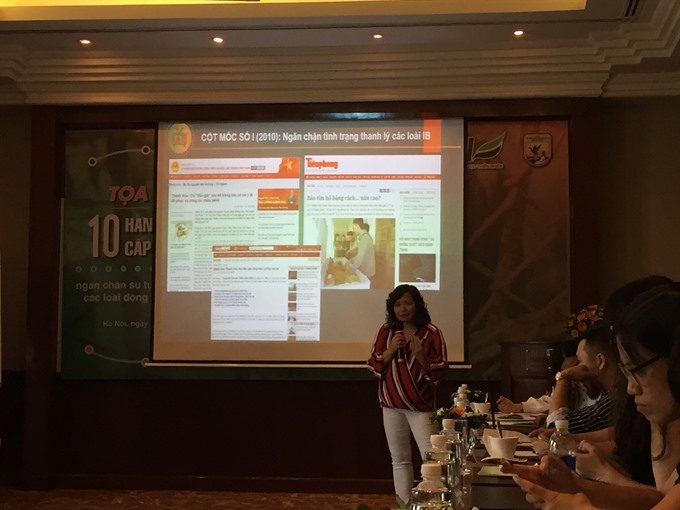 Society
Society

Shutting down social media channels used to advertise illicit wildlife is one of the actions recommended by NGO Education for Nature Việt Nam (ENV) to put an end to the wildlife trade in Việt Nam.
 |
| ENV Director Vũ Thị Quyên moderates a discussion on the media’s role in fighting wildlife trade. — VNS Photo Khoa Thư |
HÀ NỘI — Shutting down social media channels used to advertise illicit wildlife is one of the actions recommended by NGO Education for Nature Việt Nam (ENV) to put an end to the wildlife trade in Việt Nam.
ENV presented its list, titled “Ten critical actions to fight against the extinction of endangered animals,” at a press conference on Tuesday.
First presented in 2016, the list will be revised after the 2018 International Wildlife Trade conference in London this October.
According to the NGO, the 10 actions Việt Nam should take to positively impact the future of its endangered wildlife include prosecuting the leaders of criminal trafficking networks, eliminating corruption, establishing effective deterrents, banning rhino horn trade in any form, destroying all stockpiles of confiscated ivory and rhino horn. Closing tiger farms and stopping unregulated tiger breeding at zoos and rescue centers, ending bear farming, and establishing stricter controls on the licensing of commercial wildlife farms and conservation facilities are also recommended.
Thanks to efforts by Government agencies, ENV and other NGOs, 22 of Việt Nam’s 63 provinces now report no more bear farms.
On March 20, Nguyễn Mậu Chiến, leader of a major wildlife trafficking network from Africa to Việt Nam was sentenced to 13 months in prison. Chiến’s 2017 arrest marked a milestone in Việt Nam’s battle against wildlife traffickers. It was the first arrest of a suspected wildlife trafficking ring leader.
ENV director Vũ Thị Quyên stressed patience and persistence as it can take a long time for these crimes to be revealed.
“I appreciate ENV’s perseverance in exposing wildlife violations,” said Phạm Huyền, a PanNature officer. “I hope other NGOs and media organisations will join in the fight to eradicate this crime in Việt Nam.” — VNS




